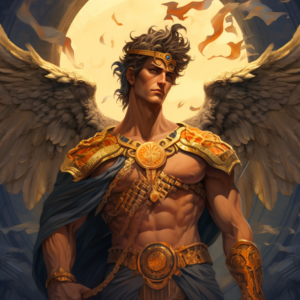Hermes, a prominent figure in Greek mythology, is the messenger of the gods and the patron of travelers, merchants, and thieves. He is one of the twelve Olympian gods and the son of Zeus and Maia, a nymph. Hermes’ birth is often associated with his swift and cunning nature, symbolizing his role as the divine communicator and guide.
Appearance
Hermes is typically depicted as a youthful and athletic deity. He is often shown wearing a winged helmet and sandals, representing his swift movement and ability to travel between realms. Hermes carries a caduceus, a staff with two entwined serpents, symbolizing his role as a messenger and his association with commerce.
Powers & Abilities
As the messenger of the gods and the patron deity of travelers, Hermes possesses incredible speed and agility, allowing him to swiftly travel between the mortal world, Mount Olympus, and the Underworld. He serves as the intermediary between the gods and mortals, he was often invoked in negotiations and conflicts to bring about peaceful resolutions, delivering messages and guiding souls to the afterlife. Hermes is also known for his wit, cleverness, and persuasive speech.
Hermes was also associated with the protection of herds and livestock. As the god of boundaries, he safeguarded the boundaries of fields and pastures, ensuring the safekeeping of domestic animals.
Hermes was the god of eloquence and rhetoric, making him a patron of public speakers, merchants, and diplomats who relied on persuasive communication.
Legend has it that Hermes created the lyre, a musical instrument, by using a turtle shell and strings, which he later gifted to Apollo.
family
Hermes is the son of Zeus and Maia, and he has numerous siblings, including Athena, Apollo, and Dionysus, among others. He is part of the larger Olympian family, which consists of the major gods and goddesses in Greek mythology.
In some versions of the myth, Hermes was the father of Pan, the rustic god of shepherds, flocks, and nature. Pan was born from the love affair between Hermes and the nymph Dryope.
Peitho, the goddess of persuasion and seduction, was often considered Hermes’ wife. Together, they were associated with the power of persuasion and eloquence.
SYMBOLS
Several symbols are associated with Hermes, each representing his domains and attributes. The caduceus, his primary symbol, symbolizes commerce, negotiation, and protection. The winged sandals symbolize his swift movement and ability to traverse great distances. Additionally, the tortoise and the rooster, both associated with Hermes, represent his connection to divination and the passage of time.
Worship
Hermes had numerous temples and sanctuaries dedicated to him throughout Greece. These places of worship were known as “Hermesia” or “Hermeion.” The most famous of these temples was the Temple of Hermes near Mount Cyllene in Arcadia, believed to be his birthplace.
Hermes was often depicted in the form of “Hermai” – stone pillars with a bust of the god on top and an erect phallus at the base. These Hermai were placed at crossroads, boundaries, and entrances to sanctuaries as symbols of protection and guardianship.
Various festivals were held in honor of Hermes. One of the most important was the “Hermaia,” a festival celebrated at various times throughout Greece. During these festivals, offerings and sacrifices were made to the god, and athletic competitions, musical performances, and theatrical plays were held in his honor.
In Athens, young boys participated in a rite of passage called “Hermokopidai,” where they would carry miniature Hermai in a procession, symbolizing their transition from childhood to adulthood under the guidance of Hermes.
Facts about Hermes
- Hermes is often associated with trickery and mischief, as he is known for his ability to outwit and deceive others, including the gods.
- He is credited with inventing the alphabet, mathematics, and various other arts and sciences.
- Hermes played a vital role in guiding souls to the Underworld, serving as a psychopomp and ensuring their safe passage.
- In addition to his role as a messenger, Hermes is also associated with fertility and is sometimes depicted as a phallic deity.
- Hermes’ quick thinking and resourcefulness are often showcased in mythological stories, making him a beloved figure among mortals and gods alike.
*As an Amazon Associate I earn from qualifying purchases.






